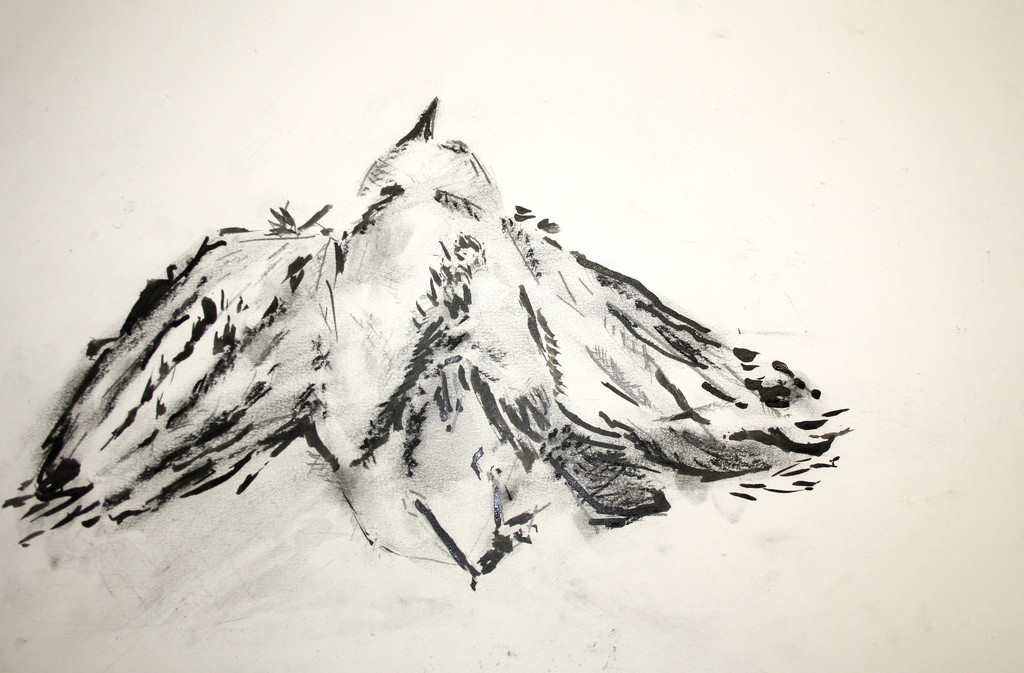Photo by Sophia.
I’ve been having an insightful shuffle through Mihaly Csikszentmihalyi’s book Creativity: The Work and Lives of 91 Eminent People. Mihaly is a seminal professor of Psychology and Management, and is the Founding Co-Director of the Quality of Life Research Center at Claremont. He writes:
“I have devoted 30 years of research to how creative people live and work, to make more understandable the mysterious process by which they come up with new ideas and new things. If I had to express in one word what makes their personalities different from others, it’s complexity. They show tendencies of thought and action that in most people are segregated. They contain contradictory extremes; instead of being an individual, each of them is a multitude.”
Nine out of the ten people in me strongly agree with that statement. As someone paid to be creative, I sometimes feel kaleidoscopic in my views or opinions, and that “multitude” of expressions sometimes confuses those around me. Why does that happen? My thoughts make cohesive sense to me, yet others sometimes feel that I am contradicting myself or switching positions. What is wrong with me?
Mihaly describes 9 contradictory traits that are frequently present in creative people:
01
Most creative people have a great deal of physical energy, but are often quiet and at rest. They can work long hours at great concentration.
02
Most creative people tend to be smart and naive at the same time. “It involves fluency, or the ability to generate a great quantity of ideas; flexibility, or the ability to switch from one perspective to another; and originality in picking unusual associations of ideas. These are the dimensions of thinking that most creativity tests measure, and that most creativity workshops try to enhance.”
03
Most creative people combine both playfulness and productivity, which can sometimes mean both responsibility and irresponsibility. “Despite the carefree air that many creative people affect, most of them work late into the night and persist when less driven individuals would not.” Usually this perseverance occurs at the expense of other responsibilities, or other people.
04
Most creative people alternate fluently between imagination and fantasy, and a rooted sense of reality. In both art and science, movement forward involves a leap of imagination, a leap into a world that is different from our present. Interestingly, this visionary imagination works in conjunction with a hyperawareness of reality. Attention to real details allows a creative person to imagine ways to improve them.
05
Most creative people tend to be both introverted and extroverted. Many people tend toward one extreme or the other, but highly creative people are a balance of both simultaneously.
06
Most creative people are genuinely humble and display a strong sense of pride at the same time.
07
Most creative people are both rebellious and conservative. “It is impossible to be creative without having first internalized an area of culture. So it’s difficult to see how a person can be creative without being both traditional and conservative and at the same time rebellious and iconoclastic.”
08
Most creative people are very passionate about their work, but remain extremely objective about it as well. They are able to admit when something they have made is not very good.
09
Most creative people’s openness and sensitivity exposes them to a large amount of suffering and pain, but joy and life in the midst of that suffering. “Perhaps the most important quality, the one that is most consistently present in all creative individuals, is the ability to enjoy the process of creation for its own sake. Without this trait, poets would give up striving for perfection and would write commercial jingles, economists would work for banks where they would earn at least twice as much as they do at universities, and physicists would stop doing basic research and join industrial laboratories where the conditions are better and the expectations more predictable.”
Sometimes what appears to be a contradiction on the surface is actually a harmony in disguise. My problem has been primarily one of communication. I am learning to let people know what I am thinking and why, and explaining myself in a way that helps them understand why I am discussing multiple perspectives instead of just cleanly stating my own. At first it might not make sense, but give me/us long enough, and it will.


i will forever remain in comfort after reading this, that we creatives are understood by our certain selves. ….. the curiosity and uncertainty of how perfect or improved i have become drives me into pure madness to create, no category, just create and often times “ Usually this perseverance occurs at the expense of other responsibilities, or other people “ – like Matthew wrote. but what other better way to be sure you indeed made a creation a valuable one, other than making it for others, your life almost seems like a sacrifice to existence itself but inside you, you know you are living even more…. you are a creative 🙂
thanks for this… #notforeveralone
it’s the answer to my hurts
Thank you
Don’t horoscopes usually use the twelve signs of the Zodiac?
It’s amazing how less alone I feel now. Thank you!
Thank you for spelling this out, Matthew. The last sentence is something I deal with all the time. In trying to have conversations with people, asking and answering questions in both directions, most people want to know “what” the answer is. It confuses and frustrates them that I’m less interested in “what” the answer is and more focused on “why” the answer is what it is. Show me the logic, the train of thought, the progression of how the answer was reached and I’m more likely to accept it as being the answer even if I don’t agree with it.
Yes!! It’s our inductive rather than deductive reasoning, John. We don’t decide on an answer and then justify it; we truly want to explore the question, and in following the logical path created by the question, discover the answer, or answers, that are there. This way, we learn the why behind the what.
I’d say it’s even more about eduction than in- or deduction. Maybe?
Very well said. Thank you.
Thank you for this post! I’ve always been unable to take a side and stay there . . . No one believes I’m introverted, but I am . . . I lose track of time when I’m writing or gardening. Thank you for describing me to myself. I’m going to print this post and hang it where I can see it often and remind myself that I am not crazy — just creative.
Creative people are bitter sweet? I love it and thanks for the great decription of a category hard to describe.